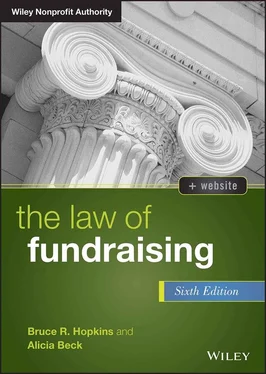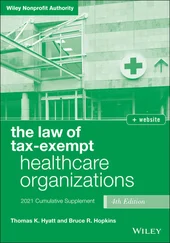Bruce R. Hopkins - The Law of Fundraising
Здесь есть возможность читать онлайн «Bruce R. Hopkins - The Law of Fundraising» — ознакомительный отрывок электронной книги совершенно бесплатно, а после прочтения отрывка купить полную версию. В некоторых случаях можно слушать аудио, скачать через торрент в формате fb2 и присутствует краткое содержание. Жанр: unrecognised, на английском языке. Описание произведения, (предисловие) а так же отзывы посетителей доступны на портале библиотеки ЛибКат.
- Название:The Law of Fundraising
- Автор:
- Жанр:
- Год:неизвестен
- ISBN:нет данных
- Рейтинг книги:4 / 5. Голосов: 1
-
Избранное:Добавить в избранное
- Отзывы:
-
Ваша оценка:
- 80
- 1
- 2
- 3
- 4
- 5
The Law of Fundraising: краткое содержание, описание и аннотация
Предлагаем к чтению аннотацию, описание, краткое содержание или предисловие (зависит от того, что написал сам автор книги «The Law of Fundraising»). Если вы не нашли необходимую информацию о книге — напишите в комментариях, мы постараемся отыскать её.
The Law of Fundraising
The Law of Fundraising
The Law of Fundraising — читать онлайн ознакомительный отрывок
Ниже представлен текст книги, разбитый по страницам. Система сохранения места последней прочитанной страницы, позволяет с удобством читать онлайн бесплатно книгу «The Law of Fundraising», без необходимости каждый раз заново искать на чём Вы остановились. Поставьте закладку, и сможете в любой момент перейти на страницу, на которой закончили чтение.
Интервал:
Закладка:
The URS project addresses registration only. Once registered, even under this uniform approach, a fundraising charitable organization is on its own in connection with annual reporting. Nonetheless, a project is under way to produce a format for annual reporting with the states in the fundraising context.
§ 3.23 OTHER LAWS
In addition to the panoply of state charitable solicitation acts, charitable organizations soliciting gift support from the public may have to face other state statutory or other regulatory requirements. These include:
A state's nonprofit corporation act, which has registration and annual reporting requirements for foreign (out-of-state) corporations that are doing business within the state. It is not clear whether, as a matter of general law, the solicitation of charitable contributions in a foreign state constitutes doing business in the state. 78 Some states provide, by statute, that fundraising is the conduct of business activities in their jurisdictions. If the solicitation of charitable contributions were declared, as a matter of general law, a business transaction in the states, the compliance consequences would be enormous, considering the fact that nearly every state has a nonprofit corporation act. This type of a requirement would cause a charitable organization that is soliciting contributions in every state to register and report more than 90 times each year, not taking into account federal and local law requirements!
A state insurance law, which may embody a requirement that a charitable organization writing charitable gift annuity contracts obtain a permit to do so and subsequently file annual statements.
A state's blue sky statute regulating securities offerings, which may be applicable to offers to sell and to sales of interests in, and the operation of, pooled income funds. These laws may also apply with respect to charitable remainder annuity trusts and unitrusts. 79
A state's law prohibiting fraudulent advertising or other fraudulent or deceptive practices. 80
A state's version of the Uniform Supervision of Trustees for Charitable Purposes Act, which requires a charitable trust to file with the state attorney general a copy of its governing instrument, an inventory of the charitable assets, and an annual report. Of similar scope and effect are the state laws that invest the state attorney general with plenary investigative power over charitable organizations.
State law concerning charitable contribution deductions and eligibility for tax-exempt status as a charitable entity. 81
As this chapter indicates, the states' charitable solicitation acts—despite some overall common features—are rather disparate. The breadth and depth of these laws testify to the failure of efforts during many years to make them more uniform, for the purpose of easing compliance with and administrating them. State law regulation of charitable soliciting continues to expand, and indications are rather clear that the states will continue to go their separate ways in this arena, rebuffing the attempts of those who would integrate and streamline this regulatory scheme.
§ 3.24 PROSPECT OF LAW CHANGES
The Senate Finance Committee, in the course of preparing federal tax legislation to further regulate the charitable sector, asked the Independent Sector to submit its recommendations as to law changes. The Independent Sector in turn convened a Panel on the Nonprofit Sector, which submitted comments as to the proposed legislation in mid-2005. Draft recommendations were submitted to the Panel from its work groups on September 22, 1995. One set of these draft recommendations pertained to the charitable solicitation process. 82
These draft recommendations observe that most public charities must solicit funds from the public in support of their programs. Charitable solicitation activities vary greatly from charity to charity, depending on factors such as the size and stage of an organization, the needs and resources within the community involved, and the judgment of an organization's governing board as to how best to fund its charitable activities in the short and long term. There also is recognition of the fact that charities may rely on for-profit professional fundraisers and consultants for assistance.
In stating the problem to which these recommendations relate, there is the further observation that state regulators, and to a lesser extent the IRS and the Federal Trade Commission (FTC), have long been concerned about fraudulent solicitations and about professional solicitors who raise charitable funds primarily for their own benefit. They are also concerned that, when charities pay large fees to professional fundraisers, they may receive only a small percentage of the total amount raised. Recognizing that there are legitimate reasons why a charity may conduct a costly solicitation campaign that results in little net revenue, such as the value of an event in increasing the visibility of the organization or the difficulty in raising funds for unpopular causes, this analysis notes that regulators and others fear that high solicitation costs signal an improper benefit conferred on a for-profit fundraiser or an abuse of charities and/or the public. Also, there is concern about fiscal loss to government, as donors take a full deduction for contributions, although only a small portion of them may be used for charitable purposes.
State charity registration and annual reporting forms are neither uniform nor filed electronically, making it difficult for charities to comply with the applicable requirements properly and for state officials to enforce the laws. Charitable organizations that solicit in multiple jurisdictions or on the Internet find compliance with state and local charitable solicitation laws increasingly confusing and costly.
The following recommendations were proposed:
Congress should require states to create a single-point electronic uniform filing system for charitable solicitation registration and annual reporting, and provide the requisite funding. This system should be designed so that central filings, the content of which should be determined by the states in consultation with the FTC and the charitable sector, would automatically satisfy the requirements of all states in which the charity solicits funds.
States should continue in their traditional role as the primary regulators of charitable solicitation activities. Current state and federal laws prohibiting fraudulent solicitation should be vigorously enforced and, where necessary, strengthened.
The IRS should firmly enforce the current law prohibitions against private inurement and substantial private benefit in the context of charitable solicitations.
Charitable organizations should actively encourage state legislatures to adopt the Model Charitable Solicitations Act or other legislation designed to effectively protect donors and to deter and punish charitable solicitation abuses.
The charitable sector should encourage the National Association of Attorneys General and the National Conference of Commissioners on Uniform State Laws to work together to update the Model Charitable Solicitations Act to address Internet and other current fundraising vehicles and practices.
As to the first of these recommendations, the draft expressed the view that Congress should not specify the content of the registration and reporting requirements, leaving development of the substance of these requirements to the states, working with the FTC, within a reasonable time frame. Periodic revisions to the registration and reporting requirements should be similarly recommended by the states. Only if states are unable to agree on uniform reporting requirements within this reasonable time frame should federal legislation imposing uniformity be considered.
Читать дальшеИнтервал:
Закладка:
Похожие книги на «The Law of Fundraising»
Представляем Вашему вниманию похожие книги на «The Law of Fundraising» списком для выбора. Мы отобрали схожую по названию и смыслу литературу в надежде предоставить читателям больше вариантов отыскать новые, интересные, ещё непрочитанные произведения.
Обсуждение, отзывы о книге «The Law of Fundraising» и просто собственные мнения читателей. Оставьте ваши комментарии, напишите, что Вы думаете о произведении, его смысле или главных героях. Укажите что конкретно понравилось, а что нет, и почему Вы так считаете.












